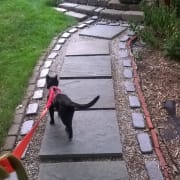-
5 people are interested
Keeping Cats Inside Campaign
ORGANIZATION: Minnesota Spay/Neuter Project
Please visit the new page to apply.
-
5 people are interested

Cats need your help. We have started our campaign to "Keep Cats Inside" to protect them from the 10 most frequent risks to free roaming cats.
- Neighbors - When cats go outside they may use your neighbor’s yard and garden as their potty area. No one enjoys digging up cat waste in their gardens or flower boxes! If your neighbor has cats, they may see your cat outside and get excited or agitated, which may prompt them to start fighting with other cats in the house or soiling in their house. Be a good neighbor and keep your cat inside!
- Cars - Thousands of cats get hit by cars every year. If they are lucky, they die instantly.
- Car engines - Cats seek warmth. In the winter they tend to climb up inside car engines where they can be subsequently ground up.
- Anti-freeze - Cats like the sweet taste of anti-freeze, and they will lick it if able. Anti-freeze is extremely toxic and your cat will die a painful death within hours of ingesting it. It can take less than a teaspoon to kill a full-size cat or dog!
- Fighting - Your cat could be seriously injured or killed by dogs, raccoons, coyotes, other wildlife and even other cats.
- TNR - Your cat could become part of a TNR (Trap-Neuter-Release) project and impounded or relocated.
- Diseases: FELV - Feline Leukemia destroys a cat's immune system. It is transmitted by cats through saliva. The vaccine for FELV is only 70 to 75% effective. Some cats infected die within two years. FIV - Feline Immunosuppressive Virus also destroys a cat's immune system. It is transmitted through bites that draw blood and cuts a cat's lifespan in half. There is no vaccination for FIV.
- Parasites - Your cat could eat something (rat, mouse, bird) and suffer from parasitic infection requiring expensive veterinary care and even die. A cat allowed outside is more likely to contract heartworm from infected mosquitos and perish from poison intended for rodents or other animals. Your cat could transmit fleas, ticks, worms, and ringworm to other pets and people in the household.
- Getting Lost - People think that because they have lived in the same house for a number of years that their cat is too smart to wander off and get lost. NOT TRUE. People also think that because their cat has never left the front yard that it won’t go any farther. Also, NOT TRUE.
- Getting Trapped - Your cat could get lost in somebody else's garage or utility shed. He could suffer brain damage if trapped in extreme heat or could suffer frostbite if trapped in extreme cold.
We have created a flyer which highlights these risks and provides safe ways for cats to have access to outdoors. We are asking that you can volunteer to post these flyers where you see free roaming cats or hear of or see lost or missing cat postings. For each 10 flyers you post, you will receive 1 hour volunteer time credit.
To volunteer to post flyers where you see free roaming cats or where you see postings of lost or missing cats, please email: minnesotaspayneuterproject@yahoo.com
MSNP will send you 10 laminated flyers and fasteners. After you have reported posting all 10 flyers, you will receive 1 hour of volunteer credit (and if you request additional flyers, you will receive one hour of volunteer credit for each 10 flyers you post).
Thank you for taking the opportunity to volunteer in your community and helping us provide a safer life for cats.More opportunities with Minnesota Spay/Neuter Project
1 ReviewNo additional volunteer opportunities at this time.
About Minnesota Spay/Neuter Project
Location:
PO Box 19546, Minneapolis, MN 55419, US
Mission Statement
The Minnesota Spay/Neuter Project, Inc. (MNSP) was founded on the conviction that the only way to end the overpopulation problem is to stop the flow at its source - by preventing unwanted litters.
Description
The Minnesota Spay/Neuter Project is non-profit organization organized exclusively for charitable, scientific and educational purposes. More specifically, we educate the general public about the benefits of spaying and neutering companion animals and in an effort to end pet overpopulation and suffering, we provide to qualifying households free sterilization, microchip, and vaccinations against distemper and rabies.
CAUSE AREAS
WHEN
WHERE
This is a Virtual Opportunity with no fixed address.
DATE POSTED
April 24, 2020
SKILLS
- Animal Therapy
GOOD FOR
N/A
REQUIREMENTS
- Must be at least 18
- One hour
